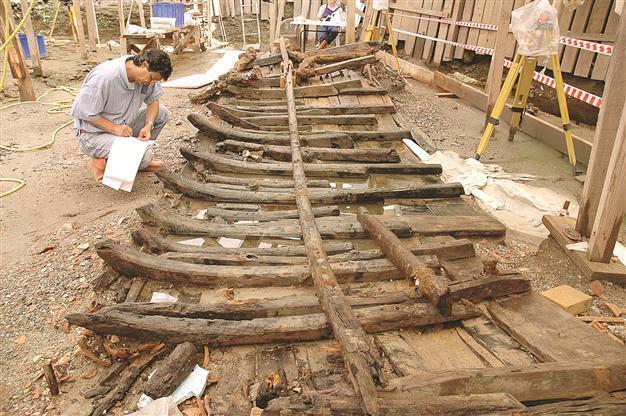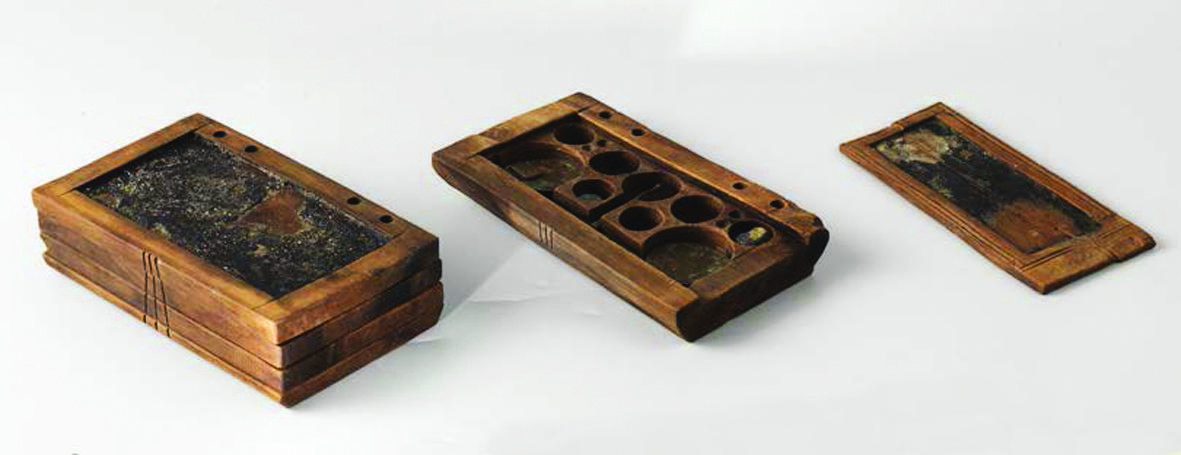Byzantine ancestors of tablet computers found in Yenikapı diggings
ISTANBUL

A wooden notebook found in a sunken ship during the Yenikapı excavation has impressed the archaelogists.
Yenikapı excavations that started nearly 10 years ago has brought back Istanbul’s historical heritage to 8,500 years. A wooden notebook, which was found in a sunken ship, the replica of which will sail, is considered the Byzantine’s invention akin to the likes of the modern-day tablet computer.
During archaeological excavations, experts have also found striking information on animal culture, such as the meat of many animals, like horses and wild donkeys were eaten in the ancient era.
Remains unearthed in the excavations drew great attention not only in Turkish, but also in world archaeology. The remains have survived as organic products, which greatly impressed the scientific world.
Within a project carried out by Istanbul University, the goal is to set the sunken ship, christened Yenikapı 12, sail again. The ship will be able to float by the middle of 2015.
Speaking about the remains, the project team member Associate Professor Ufuk Kocabaş said they had found organic products in Yenikapı area, which was known as Theodosius Port in Byzantine, a rare discovery. He said 60 percent of the sunken ship had survived in a preserved condition.
 ‘Miracle of Yenikapı’
‘Miracle of Yenikapı’“This was the first piece, which we have searched for as a doctorate thesis. Now we have information for the construction of the missing parts of the ship. Considering the amphoras in it, the ship’s route was the Black Sea. We estimate that it dates back to the 9th century and engaged in trading from Crimea to Kersonesos. A section of the ship drew our attention. We found very interesting objects belonging to the captain and crew,” Kocabaş said.
Calling the objects the “miracle of Yenikapı,” Kocabaş said, “In one of the ships, we found something like today’s notebook. It is made of wood and can be opened like a notebook. It has a few pages and you can take notes using wax. Also, when you draw its sliding part, there are small weights used as an assay balance. Yenikapı is a phenomenon with its 37 sunken ships and organic products. I think these organic products are the most important feature of the Yenikapı excavations.”
He said they had reached the archaeological excavations even 28 meters below the sea level, which is unbelievable. “The route that we are planning for vehicles will start from Bucoleon Palace. Significant pieces could be unearthed there.”
Professor Vedat Onar, the head of the team examining the animal remains unearthed in Yenikapı, said they had completed the largest horse collection of the Byzantine-era.
“Horses were killed for consumption, which we are seeing for the first time in these excavations. This type of meat was not much preferred in the Roman-era, but we see it in the Byzantine times. It is hard to see a horse older than 10-years-old. Their life was short. We have found remains from 57 kinds of animals. There was even dolphin and turtle hunting,” he said.

 ‘Miracle of Yenikapı’
‘Miracle of Yenikapı’